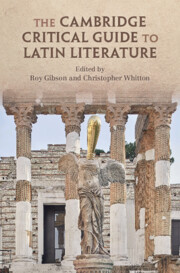Book contents
- The Cambridge Critical Guide to Latin Literature
- The Cambridge Critical Guide to Latin Literature
- Copyright page
- Dedication
- Contents
- Figures and Tables
- Contributors
- Preface
- Abbreviations
- Chapter 1 Introduction
- Chapter 2 Canons
- Chapter 3 Periodisations
- Chapter 4 Author and Identity
- Chapter 5 Intertextuality
- Chapter 6 Mediaeval Latin
- Chapter 7 Neo-Latin
- Chapter 8 Reception
- Chapter 9 National Traditions
- Chapter 10 Editing
- Chapter 11 Latin Literature and Linguistics
- Chapter 12 Latin Literature and Material Culture
- Chapter 13 Philosophy
- Chapter 14 Political Thought
- Chapter 15 Latin Literature and Roman History
- Chapter 16 Latin Literature and Greek
- Envoi
- Index Locorum
- General Index
- References
Chapter 14 - Political Thought
Published online by Cambridge University Press: 04 January 2024
- The Cambridge Critical Guide to Latin Literature
- The Cambridge Critical Guide to Latin Literature
- Copyright page
- Dedication
- Contents
- Figures and Tables
- Contributors
- Preface
- Abbreviations
- Chapter 1 Introduction
- Chapter 2 Canons
- Chapter 3 Periodisations
- Chapter 4 Author and Identity
- Chapter 5 Intertextuality
- Chapter 6 Mediaeval Latin
- Chapter 7 Neo-Latin
- Chapter 8 Reception
- Chapter 9 National Traditions
- Chapter 10 Editing
- Chapter 11 Latin Literature and Linguistics
- Chapter 12 Latin Literature and Material Culture
- Chapter 13 Philosophy
- Chapter 14 Political Thought
- Chapter 15 Latin Literature and Roman History
- Chapter 16 Latin Literature and Greek
- Envoi
- Index Locorum
- General Index
- References
Summary
Roman concepts and institutions have been formative for Western political forms and the Romans’ thinking about power has had a deeper influence on Western traditions of political thought than is recognized in political theory. Recent developments have sparked the interest of political theorists in genres and artefacts that convey thinking about politics through means besides distinct argumentation. At the same time, the political turn in the study of Latin literature has opened the field to theoretical questions beyond the range of usual literary training. This chapter surveys issues, such as freedom, institutions, and foundation, which are central to Roman political thought, and maps a variety of methods for approaching how the Romans thought about politics. These include: close reading, rhetorical analysis, conceptual history, comparison with other media and cultural artefacts, and metaphorology. Illustrative interpretations span art and inscriptions, poetry and prose, with excurses on the reception and transformation of Roman political thinking in Augustine and Machiavelli. A sample reading of the death of Turnus in the Aeneid argues for a broad intellectual toolkit.
Keywords
- Type
- Chapter
- Information
- The Cambridge Critical Guide to Latin Literature , pp. 753 - 816Publisher: Cambridge University PressPrint publication year: 2024



